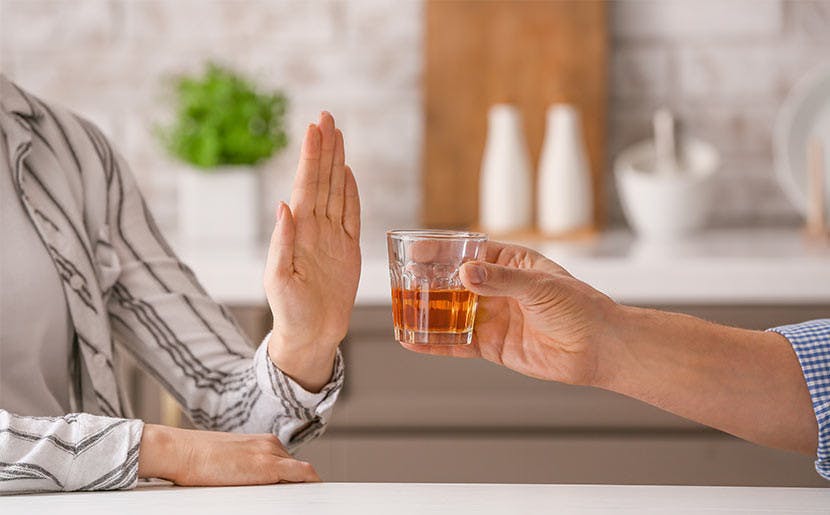Drinking Alcohol Causes Brain Damage and Hurts Your Body
Article by:
Amazing Discoveries™ |
10 min read
Does alcohol kill brain cells? This article looks at the health risks of drinking and evidence that shows drinking alcohol causes brain damage.
The consumption of alcohol is ingrained in society. To many people, a party isn’t really a party without an alcoholic drink. The weekend just isn’t the same without a cold beer or two. For many people, alcohol seems like the perfect way to unwind after a long day at work.
Alcohol sales around the world topped $1.5 trillion in 2017.1 The United States National Survey on Drug Use and Health found that 85.6% of people over the age of 18 had consumed alcohol, and 69.5% had had alcohol in the past year.2
Although alcohol use is viewed as a fun or relaxing social activity that might even offer health benefits, it’s actually a deadly poison that can ruin your health, destroy relationships, and wreak havoc in nearly every aspect of your life. Even in very small amounts, alcohol is a carcinogen3 that negatively impacts the body and mind when consumed. The WHO states that in 2016, 3 million people died as a result of alcohol.4 Alcohol is directly linked to many immediate and long-term health complications and is a major factor in social and interpersonal problems,5 violence, motor vehicle accidents, and mental health issues.6
Alcohol, a Major Health Concern
In the 1980s/90s the term “French paradox” was coined. Although the French consume high amounts of saturated fat and smoke heavily, they seem to have lower rates of heart disease. This dichotomy baffled the scientific and medical communities. After some investigation, scientists concluded that the French obtain health benefits from the wine they consume, and this aids in the prevention of heart disease.

Since then, many studies have been done on the potential health benefits of red wine. Red wine is made from grapes, and grapes are high in antioxidants, flavonoids, and resveratrol. Resveratrol is a chemical compound that may have beneficial effects.7 Flavonoids are another chemical compound with many beneficial properties.8 Antioxidants are also important as they help your body restore balance and fight cancer-causing free radicals. But all these beneficial compounds occur naturally in the grapes themselves. Fermenting the grapes is unnecessary. Nobody needs to drink wine to get these benefits.
Grapes in their pure, natural state don’t come with the harmful side effects of alcohol and can be enjoyed by people of all ages. The benefits of wine should be attributed to the grapes used to make the wine, rather than to the wine itself. The dangers of alcohol far outweigh the possible benefits that may come from moderate alcohol consumption.
Effects on the Body
Rather than promoting good health, alcohol is a major hindrance to your body. Alcohol is a poison and your body treats it as such.9 Alcohol can have a wide range of both short- and long-term effects on the body, which are unpleasant at best and fatal at worst. Overall, alcohol consumption is a major contributing factor to poor health.
Consuming any amount of alcohol lowers your life expectancy.10 Alcohol has a detrimental effect on the whole body. Every system in your body is affected either short-term or long-term when you drink. While drinking to excess is the cause of many alcohol-related health problems, even drinking moderately increases your risk of experiencing negative side effects in the health of your brain, heart, respiratory system, liver, and other systems in your body.
Does Alcohol Kill Brain Cells?
The brain is an amazing organ which acts as your body’s command center. It’s responsible for the regulation of your body’s systems, processing thoughts and dictating actions, and communicating with God. When you consume alcohol, you directly harm or alter your brain – physically and psychologically.
A recent Oxford study11 found that drinking alcohol causes brain damage, no matter how little is drunk or what the form, whether beer, wine, or spirits. People who drink any amount have less gray matter, regions in the brain where information is processed, than those who don’t. Smaller brain volume is a predictor for poorer scores on memory tests.
In addition, when you drink, you diminish your brain’s ability to make rational decisions. This happens because alcohol increases your levels of norepinephrine, a neurotransmitter that is a stimulant which helps to lower inhibitions and impulse control.12

Why Does Alcohol Make You Drunk?
Alcohol affects your prefrontal cortex, the front region of your brain that’s responsible for the formation and execution of thoughts and actions. The prefrontal cortex is responsible for preventing you from doing things that would cause harm, like touching a hot stove. Alcohol diminishes the ability of the prefrontal cortex to make good decisions, further lowering inhibitions and increasing the chance of making risky or regrettable choices.13
Heart
Alcohol causes damage to your circulatory system. When you drink alcohol, it makes your heart work harder temporarily. But drinking long-term can cause you to consistently have a higher heart rate and blood pressure and can weaken your heart. This makes it more likely for you to suffer a cardiovascular event.14
Respiratory System
Drinking too much long-term can increase your risk of developing respiratory diseases.15 This is partially due to the fact that alcohol compromises your immune system, which decreases the body’s ability to fight invaders and can even affect the body’s recovery abilities.16
Liver
One of the greatest known ill effects of consuming alcohol is damage to the liver. Your liver bears the brunt of your alcohol consumption because it is responsible for dealing with the alcohol,17 which your body recognizes as a toxin. There is a definitive link between excessive alcohol intake and liver disease.18 While those who drink heavily are at greatest risk for developing liver disease, an intake upwards of about four units of alcohol per day (equivalent to 100 ml or approximately 3 ounces of whisky) presents a threat to the liver by increasing your risk of developing fatty liver disease.19
General Effects
In addition, alcohol has numerous broad and negative consequences for your health. Alcohol can trigger hypoglycemia,20 impair your body’s ability to absorb essential vitamins and nutrients,21 and can exacerbate or trigger gout.22 Alcohol is a contributing factor in the development of reactive oxidative species within your body.23 Reactive oxidative species are damaging free radicals and reactive molecules which can cause harm to your cells and promote the development of cancer.
Consumption of alcohol increases toxicity in the body.24 When alcohol is metabolized, it turns into acetaldehyde, an incredibly toxic chemical.25 Acetaldehyde damages cells and DNA26 and inhibits cellular repair.27 As alcohol is a carcinogen,28 the American Cancer Society says that to reduce your cancer risk you shouldn’t drink at all.29
Simply put, there is no safe level of alcohol consumption.
Alcohol is Highly Addictive
Alcohol is a highly addictive substance. Some people may be hooked after only a few drinks. For others, it may take longer to get to a place where they feel they have to drink regularly. Many factors, such as your gender, age, ethnicity, or whether your family has a history with addictions or alcohol abuse can influence how you react to alcohol.
Regular drinking can lead to alcohol dependence. Regular consumption of alcohol over time can alter your body and mind.30 When you consume alcohol, your brain is prompted to release chemicals that make you feel good, such as dopamine. This makes you seek out alcohol in order to experience that good feeling again.31

A huge factor in the addictiveness of alcohol is how alcohol is viewed by society. Alcohol is a major feature at celebratory events such as weddings, birthdays, and graduations. It’s seen in a positive light, as a way to have more fun or loosen up. You may feel pressured to drink by friends or family when you attend events or gatherings because it’s just the thing to do.32 People who choose to abstain from alcohol might be ridiculed or accused of bringing the mood down. Don’t be intimidated by this kind of peer pressure. You alone are responsible for the choices you make and their consequences. If you refuse to drink, you’ll become stronger to resist future pressure to drink or participate in other health-destroying activities.
Alcohol is also depicted as a way to escape or unwind from stress or pain (emotional or otherwise) in your life. However, alcohol is not a fix for your problems, nor is it necessary for having a good time. Becoming dependent on alcohol to relieve stress, help you escape from life, or have fun isn’t healthy, and will only create more problems in the long run.
Young People & Alcohol
Because alcohol consumption is so common and legal, you might forget that it’s actually a drug. While many parents encourage their young adults to stay away from other drugs, many feel it’s acceptable for young people to drink moderately or in social settings.

Today’s young adults are constantly harassed by media promoting the use of alcohol, depicting it as a way to have fun, fit in, and be seen as good company. While alcohol isn’t safe for anyone, it poses higher risks for young people. The brain continues to develop until you’re in your twenties – therefore, alcohol can have a profoundly negative effect on the still-developing brain.33 Alcohol has the potential to cause liver damage and an imbalance of hormones in young adults.34 Alcohol consumption also increases the likelihood of engaging in risky behaviors, further endangering physical, mental, and emotional wellbeing.
Expense of Alcohol
Alcohol can be costly, and not just in the financial sense.
The strain of alcohol on health worldwide is worse than the negative side effects resulting from neglect of exercise, high cholesterol levels, obesity, or even illegal drugs.35 A study published in The Lancet found that consumption of alcohol “is a marked contributor to the loss of healthy life”.36
In addition to health risks, alcohol use often has a negative effect on the social and economic areas of a person’s life. Misuse of alcohol can lead to abuse or neglect of family and friends, inappropriate use of finances, loss of income due to inability to hold down a job, and many other things that contribute to a poor quality of life.

A healthy, balanced life can be enjoyable without the use of stimulants. Even if you only drink occasionally, or don’t think you have an alcohol problem, seriously consider whether alcohol is a risk you’re willing to take. Experts say there is no safe level of alcohol consumption. If something is proven to cause harm, it’s best to avoid it entirely.
These statements have not been evaluated by the Food and Drug Administration or Health Canada. Our articles, videos and products are not intended to diagnose, treat, cure, or prevent any disease. If you are pregnant, nursing, taking medication, or have a medical condition, consult your physician before following any recommendations or using any product on our site. You assume sole responsibility for your personal health, and you must use your own discretion under doctor consultation to determine whether any product or recommendation on this site is suitable for your personal situation.








